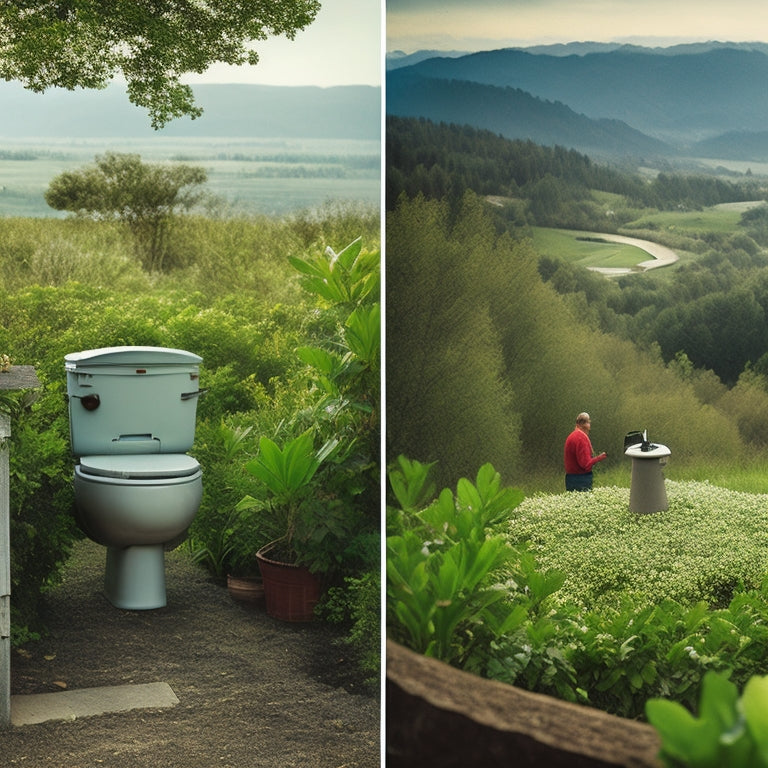
Why Composting Toilet Laws Vary Across States
Share
You encounter varying composting toilet laws across states because local environmental conditions, water availability, and community needs create unique challenges that demand customized regulations. State-specific water conservation goals, sewage infrastructure, and environmental concerns influence these laws. For instance, California encourages composting toilets to reduce water consumption, while water-scarce states like Arizona and Nevada have their own regulations. Local permitting requirements, ordinances, and zoning laws further complicate the scenario. As you maneuver through these differences, you'll find that understanding the intricacies of composting toilet laws is essential for successful installation and operation, and there's more to investigate in the world of sustainable sanitation practices.
Key Takeaways
- Composting toilet laws vary across states due to local environmental conditions, water availability, and community needs.
- State-specific water conservation goals, such as California's 50% reduction target by 2030, influence composting toilet regulations.
- Regulations are shaped by the presence or absence of sewage infrastructure, with water-scarce states like Arizona and Nevada allowing exceptions to traditional plumbing codes.
- Local permitting requirements, ordinances, and zoning laws critically determine composting toilet installation, with varying regulations by area.
- Environmental impact and sustainability concerns, including pathogen reduction and nitrogen management, also drive differences in composting toilet laws across states.
Composting Toilet Laws in California
In California, approximately 40% of the state's water supply is used for residential purposes, making water conservation a top priority.
As you consider installing a composting toilet, you'll be pleased to know that California encourages water-efficient practices. By incorporating renewable energy sources, such as solar and wind power, into your composting toilet system, you can further reduce your carbon footprint Renewable Energy Sources.
You can legally install a composting toilet in your home, as long as it meets the California Building Standards Code and local plumbing codes.
Composting toilets offer significant environmental benefits, such as reducing water consumption and producing a beneficial nutrient-rich compost. Additionally, many users report positive experiences with these toilets, citing improved hygiene and reduced odors.
Regulations in Water-Scarce States
You'll find that water-scarce states, such as Arizona, Nevada, and New Mexico, have unique regulations governing composting toilets.
These desert states often have exceptions to traditional plumbing codes, allowing for alternative toilet systems that conserve water.
As you investigate these regulations, you'll see that they're closely tied to water conservation goals, which are critical in regions where water is a limited resource.
Desert State Exceptions
Desert states, where water scarcity is a persistent concern, have implemented unique regulations for composting toilets. You'll find that Arizona, California, and Nevada have specific guidelines for composting toilet systems.
These states recognize the desert climate's impact on water availability and the ecological benefits of reducing wastewater. In addition, they're also promoting the use of renewable energy solutions such as solar panels and electric vehicle charging stations to reduce their carbon footprint.
By adopting these sustainable practices, they can minimize their reliance on fossil fuels and mitigate the effects of climate change.
In Arizona, for instance, you're required to obtain a permit from the Department of Environmental Quality before installing a composting toilet.
California has specific standards for composting toilets, including requirements for pathogen reduction and nitrogen management.
Nevada, meanwhile, has guidelines for both commercial and residential composting toilet systems.
Water Conservation Goals
States like Arizona, California, and Nevada have set ambitious water conservation goals, driving the adoption of composting toilets as a viable solution. As you investigate the regulations in water-scarce states, you'll notice a focus on sustainability practices that minimize environmental impact. These states aim to reduce water consumption, and composting toilets play an essential role in achieving this goal.
| State | Water Conservation Goal | Composting Toilet Regulations |
|---|---|---|
| Arizona | 40% reduction by 2025 | Allowed for single-family homes, conditional on meeting specific standards |
| California | 50% reduction by 2030 | Permitted statewide, with varying local regulations |
| Nevada | 30% reduction by 2025 | Legal for residential use, pending local permits and inspections |
East Coast Composting Restrictions
Composting toilet regulations vary considerably along the East Coast, with some states embracing these eco-friendly alternatives and others imposing strict restrictions.
You'll find that states like Vermont and Massachusetts have implemented laws to promote the use of composting toilets, recognizing their composting benefits in reducing water consumption and environmental impact.
Additionally, the integration of renewable energy sources, such as solar-powered charging, can further reduce the carbon footprint of these eco-friendly alternatives.
These states understand that composting toilets can profoundly decrease the amount of wastewater generated, resulting in a lower environmental impact.
However, other East Coast states, such as New York and New Jersey, have more stringent regulations, limiting the use of composting toilets to specific circumstances, like remote areas without access to sewage infrastructure.
State-Specific Health Department Rules
You'll need to maneuver local permitting requirements, which vary by state and even by county or municipality, to guarantee your composting toilet complies with health department regulations.
In many cases, you'll need to obtain a permit or approval from the local health department before installing a composting toilet.
Additionally, you'll want to understand the regulatory agency oversight in your area, as it may impact the type of composting toilet you can install and how it must be maintained.
Moreover, similar to how electrical infrastructure upgrades can affect EV charging station installation costs, local regulations can influence the cost and complexity of composting toilet installations.
Local Permitting Requirements
Frequently, homeowners and builders face the challenge of maneuvering local permitting requirements, which can vary considerably from state to state and even within different counties or municipalities.
You'll need to traverse local compliance regulations, guaranteeing your composting toilet system meets specific standards. Furthermore, securing government incentives for sustainable infrastructure, such as Federal EV Charging Incentives, can be vital for project viability.
-
You may encounter restrictive zoning laws that limit the use of alternative toilet systems in certain areas.
-
You'll need to comply with local building codes, which can be outdated or unclear when it comes to composting toilets.
-
You may face lengthy and costly permitting processes, delaying your project's timeline and increasing costs.
It's essential to research and understand the local permitting requirements in your area to avoid costly mistakes and guarantee a successful installation.
Regulatory Agency Oversight
More than 40 state health departments have established specific guidelines for composting toilet systems, outlining the minimum requirements for installation, operation, and maintenance.
You'll need to familiarize yourself with these guidelines, as they vary across states. Regulatory agency oversight plays an essential role in ensuring compliance with these guidelines.
State health departments are responsible for enforcing regulations, conducting inspections, and providing guidance on compliance.
You may face compliance challenges, such as maneuvering through complex regulations or meeting specific standards for waste treatment.
Understanding the regulatory agency roles and their expectations can help you overcome these challenges.
Local Ordinances and Zoning Laws
Local ordinances and zoning laws are often the most critical factors in determining whether a composting toilet can be installed in a particular location.
You'll need to research and understand the specific regulations in your area, as they can vary considerably.
Some key considerations include:
-
Local community involvement: will your neighbors be concerned about the aesthetic or potential odors?
-
Environmental impact assessments: how will the composting process affect local waterways or soil quality?
-
Zoning restrictions: are there specific areas designated for wastewater treatment or disposal?
Variations in Rural Vs Urban Areas
In rural areas, where septic systems are often the norm, composting toilets may be viewed as a welcome alternative, allowing homeowners to reduce their water consumption and minimize their environmental footprint.
You'll find that rural advantages include more lenient regulations and a greater need for off-grid solutions. Composting toilets can be a cost-effective and efficient option for rural residents, especially those with limited access to municipal sewer systems.
In contrast, urban challenges arise from denser populations and existing infrastructure. You may face stricter regulations and higher upfront costs when installing a composting toilet in an urban area.
However, some cities offer incentives for eco-friendly upgrades, so it's important to research local policies and ordinances before making a decision.
Frequently Asked Questions
Can Composting Toilets Be Used in Areas With High Water Tables?
You can use composting toilets in areas with high water tables if you implement proper waste management systems, such as raised toilets or mound systems, to prevent groundwater contamination and guarantee safe wastewater disposal.
Do Composting Toilets Require Special Installation or Maintenance Training?
As you commence on the eco-friendly expedition, imagine yourself steering through a serene forest, where each tree represents a vital step in composting toilet installation and maintenance. You'll need to follow specific installation requirements and maintenance guidelines to guarantee a harmonious relationship with nature, and your freedom from water woes.
Can I Use a Composting Toilet in an RV or Mobile Home?
You can use a composting toilet in an RV or mobile home, enjoying benefits like water conservation and reduced waste; many users rave about the convenience and odor-free experience, but be prepared for a more detailed maintenance routine and potential space constraints.
Are Composting Toilets Suitable for Large Families or Communities?
When considering composting toilets for large families or communities, you'll need to factor in family size considerations and community needs, ensuring the system can handle increased waste volume and maintain efficient decomposition and nutrient cycling.
Can I Build My Own Composting Toilet or Must I Buy One?
Will you dare to take the DIY composting route, or play it safe with a commercial model? Before you decide, consider the legal considerations: local building codes, permits, and regulations may dictate your options, so do your research to avoid costly mistakes.
Related Posts
-

Why Transform Human Waste Into Garden Gold?
By changing human waste into garden gold, you'll reduce waste management costs, support sustainable agriculture, and ...
-

10 Eco-Friendly Air Management Tools for Clean Home Living
You're taking an essential step towards creating a healthier living space by seeking eco-friendly air management tool...
-

7 Smart Air Purification Hacks for Energy-Savvy Homes
You can notably improve your indoor air quality while minimizing energy consumption by implementing strategic air pur...


